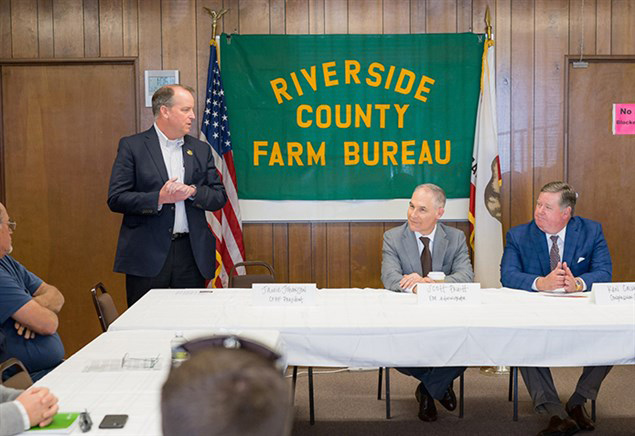
California Farm Bureau Federation President Jamie Johansson, left, speaks to U.S. Environmental Protection Agency Administrator Scott Pruitt and Rep. Ken Calvert during a roundtable meeting at the Riverside County Farm Bureau.
Photo/Eric Vance, EPA
March 29, 2018 - By Christine Souza - In order to hear firsthand from California farmers and ranchers, U.S. Environmental Protection Agency Administrator Scott Pruitt held two roundtable discussions in the state this week on issues of interest to agriculture—including the "waters of the United States" or WOTUS rule.
"We're listening to stakeholders to make sure that we are making informed decisions," Pruitt told a group of Southern California farmers and agricultural representatives during the discussion at the Riverside County Farm Bureau in Moreno Valley.
A WOTUS rule finalized by the EPA and U.S. Army Corps of Engineers under the Obama administration in 2015 would significantly expand the definition of waters regulated under the Clean Water Act. The rule came under criticism from farmers, ranchers and other landowners.
"The 2015 water rule was really not about water quality as much as it was about power and jurisdiction," Pruitt said, adding that his agency will work this year to rescind the 2015 rule.
"We will provide a new definition going forward because at the end of the day, the agency needs clarity," he said. "The public across the country needs to know what waters are in and what waters are out."
Pruitt noted that during his time as EPA administrator, the agency has tackled 22 regulatory actions that brought savings of about $1 billion on the regulatory side.
While regulatory reform and fixing WOTUS are important, Pruitt said, "it is not the most difficult thing we are dealing with, which is this attitude or view that you can't give out jobs and have growth and protect the environment; that you have to choose between one or two of those things."
Pruitt was joined by California Farm Bureau Federation President Jamie Johansson and Rep. Ken Calvert, R-Corona, who pointed out issues faced by California agriculture such as regulatory challenges, limitations on crop protection materials and permitting delays.
Orange County Farm Bureau President Mark Lopez, who runs an agricultural application company, said he is impressed with the direction the EPA is going, adding that when a crop-protection material becomes unavailable, "we need something to replace it."
Riverside County Agricultural Commissioner Ruben Arroyo noted that California has "the most stringent pesticide program in the nation."
Growers around the table mentioned the threat to the state's citrus groves from the Asian citrus psyllid, adding that help is needed to identify crop-protection materials to control the pest and ultimately save California citrus production. The psyllid can carry a disease known as huanglongbing, or HLB, which kills citrus trees and has caused significant crop losses in Florida and elsewhere.
"If we can control the insect, we can control the disease," Arroyo said, adding that HLB has a latency period of two to five years.
"We could have it widespread, we just don't know it yet. There is no early detection method," he said.
Following the discussion in Riverside County, Pruitt was scheduled to meet with farmers in Stanislaus County.
(Christine Souza is an assistant editor of Ag Alert. She may be contacted at csouza@cfbf.com.)
Reprinted with permission: California Farm Bureau Federation









